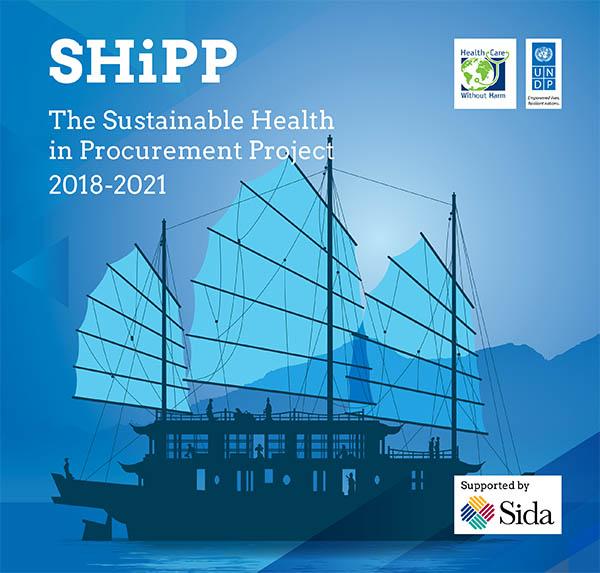Health Care Without Harm Global and GGHH webinar series
Success stories from the Sustainable Health in Procurement Project (SHiPP)
Health Care Without Harm Global and its Global Green and Healthy Hospital (GGHH) program are pleased to announce an upcoming webinar on the success stories from the Sustainable Health in Procurement Project (SHiPP) on the eve of World Environment day, June 4 2020.
This webinar is the first of a series that Health Care Without Harm Global and GGHH will be hosting in 2020 to educate and engage GGHH member institutions and the broader health care sector community on strategies and resources to implement sustainable procurement in health care facilities around the world.
SHiPP is a four-year project jointly implemented by Health Care Without Harm and the United Nations Development Programme (UNDP) in ten countries aiming to promote sustainable procurement in the health sector and in the United Nations (UN) Agencies. The project focuses on the reduction of toxicity of chemicals and materials in health products, the reduction of greenhouse gases in the supply chai, and the conservation of resources.
Focusing on a group of lower and middle- income countries, the project aims to develop and pilot a set of sustainable health procurement practices and policies.
After the webinar participants will be able to:
- Demonstrate the impact of procurement on health and environment
- Share successful examples of sustainable procurement from around the world
- Replicate and adapt good practice examples into their procurement process
Presenters
Dr. Ishika Jharia, Centre for Chronic Disease Control, India (Session 1)
Ishika is a Dental Surgeon with a Masters in Health & Hospital Management from the Indian Institute of Health Management Research, Jaipur. She is currently working as a Project officer & Research Associate for the Sustainable Health in Procurement Project in India, that aims to work with the Indian health sector and allied partners including manufacturers and suppliers of pharmaceutical products and medical devices to reduce the harm to people and the environment caused by the delivery of healthcare services and manufacture, procurement, use and disposal of medical products.
Mr. Ramon San Pascual, Health Care Without Harm South East Asia (Session 1)
Ramon is the Director of Health Care Without Harm South East Asia. A Bachelor of Political Economics graduate from the Polytechnic University of the Philippines, Ramon obtained his Masters in Public Health in 2007 from the University of Washington in Seattle, WA, United States. Alongside the MPH, he also completed a Certificate Program on International Health. Earlier in 2003-2004, he completed the Population Leadership Program as a Gates-Packard International Fellow also at the University of Washington.
Ms. Santie Roy, Director Supply Chain, Western Cape Government Health, South Africa (Session 2)
Santie started her career in supply chain with the world’s largest private healthcare provider. She has since worked in the construction, oil & gas, property, facilities management, media and manufacturing industries. Before joining Western Cape Government Health, in 2014, Santie led strategic outsourcing projects in the UK & mainland Europe, engaging with leading service providers to establish mutually beneficial long-term partnerships. Santie believes that supply chain officials are in a unique position to gain a deep understanding of their customers and service providers, and that public sector supply chain organizations can embrace private sector practices for delivery of optimal commercial and outcomes.
Ms. Claudia Paz, Health Care Without Harm Latin America (Session 2)
Claudia provides technical assistance to the Global Green and Healthy Hospitals network and leads the implementation of the annual call of Menos huella, más salud (Less footprint, more health) awards. She also collaborates to strengthen the impact of the SHiPP project in the region.
Based in Cali, Colombia, she has a degree in environment and natural resources management. She has managed hazardous and non-hazardous waste, clean energy, water saving, and carbon footprint programs, among others.
When
Session 1: Thursday, 4 June 2020 - Asia and the Pacific
- 9:30 am - India Standard Time
- 9:45 am - Nepal Time
- 12:00 pm - Singapore | Beijing, China | Manila, Philippines
- 2:00 pm - Australian Eastern Time
- 4:00 pm - New Zealand Time
- 9:00 pm (Wednesday, 3 June) - Pacific Standard Time
Session 2: Thursday, 4 June 2020 - The Americas, Africa and Europe
- 7:30 am - Pacific Standard Time
- 10:30 am - Eastern Standard Time
- 11:30 am - Buenos Aires, Argentina, and São Paulo, Brazil
- 3:30 pm - Greenwich Mean Time
- 4:30 pm - Central Europe
- 4:30 pm - South Africa Standard Time
- 5:30 pm - Turkey Time
